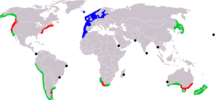普通滨蟹
普通滨蟹(学名Carcinus maenas),又名美娜斯滨蟹或三叶真蟹,是滨海带很普遍的蟹。[2]它们原产于东北大西洋及波罗的海,但进占到相似环境的澳洲、南非、南美洲及北美洲的大西洋和太平洋海岸。它们阔9厘米,吃多种软体动物、蠕虫及细小的甲壳类,对多种渔业潜藏影响。国际自然保护联盟物种存续委员会的入侵物种专家小组(ISSG)列为世界百大外来入侵种。
| 普通滨蟹 | |
|---|---|

| |
| 科学分类 | |
| 界: | 动物界 Animalia |
| 门: | 节肢动物门 Arthropoda |
| 亚门: | 甲壳亚门 Crustacea |
| 纲: | 软甲纲 Malacostraca |
| 目: | 十足目 Decapoda |
| 亚目: | 腹胚亚目 Pleocyemata |
| 下目: | 短尾下目 Brachyura |
| 科: | 滨蟹科 Carcinidae |
| 属: | 滨蟹属 Carcinus |
| 种: | 普通滨蟹 C. maenas
|
| 二名法 | |
| Carcinus maenas | |

| |
| 异名 | |
| |
特征
编辑普通滨蟹的壳长达6厘米及阔9厘米[3],每只眼睛后沿边有五只短锯齿,眼睛之间有三个起伏位置。这些起伏可以用来分辨普通滨蟹及艾氏滨蟹。艾氏滨蟹的甲壳没有肿起的地方,并延伸至眼睛之前。另外,普通滨蟹的第一及第二游泳足是向外弯曲,艾氏滨蟹的则是笔直的。[3]
普通滨蟹有很多不同颜色,由绿色至褐色、灰色或红色。这些分别有遗传的性质,但大部份都是环境因素所致。[4]那些脱壳较迟的会变成红色,而非绿色。红色的较为强壮及富攻击性,但对环境(如盐度及缺氧)的耐性较低。[5]
原产及入侵地
编辑普通滨蟹原产于欧洲及北非海岸,东至波罗的海,北至冰岛及挪威中部,是分布地内最为普遍的蟹。在地中海,它们被近亲的艾氏滨蟹所驱逐。
普通滨蟹在北美洲最先是于1817年的麻萨诸塞州发现,现已向南扩展至维吉尼亚州南部。2007年,它们的分布地已扩展至加拿大纽芬兰-拉布拉多的布雷森莎湾(Placentia Bay)。[6]于1989年,它们出没于旧金山湾。它们于1997年、1998年及1999年分别抵达俄勒冈州、华盛顿州及英属哥伦比亚[7][8],10年内扩展达750公里。[9]到了2003年,它们更走到南美洲的巴塔哥尼亚。[10]
在澳洲,普通滨蟹首先于1800年代在维多利亚州菲利普港(Port Phillip)发现。自此它们散布到东南及西南海岸,并于1971年、1976年及1993年分别到达新南威尔士、南澳洲州及塔斯曼尼亚。于1965年在西澳州发现一只普通滨蟹,但却自此没有再发现其他。[11]
普通滨蟹首次于1983年在南非近开普敦出现。[12]自此它们扩散至北方的沙丹那湾(Saldanha Bay)及南方的坎普斯湾(Camps Bay)。
在巴西、巴拿马、夏威夷、马达加斯加、红海、巴基斯坦、斯里兰卡及缅甸都有发现普通滨蟹。不过这些只是个别事件,并非入侵群落。日本已被艾氏滨蟹或是艾氏滨蟹与普通滨蟹的混种所入侵。[13]
根据生态环境,相信普通滨蟹也会入侵到北美洲由下加利福尼亚州至阿拉斯加的太平洋海岸。[7]很多地方也有相类似的生态环境,现只有新西兰并未大幅入侵。新西兰政府已采取措施,如发出海生害虫指引等来限制普通滨蟹的入侵。[14]
生态
编辑普通滨蟹可以在海洋及河口环境生活,以泥、沙或岩石海床、水生植物及沼泽最为适合。它们可以抵受4-52‰的盐度,并能在0-30C的温度下生存。[15]故此它们可以在河口的低盐度环境生存。使用COI基因进行的分子生物学研究显示在北海及比斯开湾的群落互有遗传的不同,而冰岛及法罗群岛的群落则有更大的不同。由此可见普通滨蟹很难进入较深的水域。[16]
雌蟹可以产达18万5千颗卵,幼体会在离岸地方成长,当脱壳后幼蟹就会走到潮间带。[17]幼蟹会生活在海藻及海草之间,直至成为成体。[18]
普通滨蟹具有多种方式来将群落扩散[17],包括压载水、船体、以海藻等物料包装、泛舟、幼体随海流迁徙等。在澳洲的普通滨蟹可以扩散很长的距离,可以是由人类活动所带动。
普通滨蟹是多种生物的掠食者,尤其是双壳纲[19]、多毛类及细小的甲壳类。[20]它们主要是夜间活动的,但随潮汐也会在日间活动。[21]在加利福尼亚州,它们掠食当地的蛤蜊令其数量下降,并令入侵的蛤蜊(如宝石文蛤)增加。[22]它们也导致了美国东岸及加拿大砂海螂渔业的催毁,并令一些具重要商业价值的双壳纲数量减少。[17]它们也会吃鱼类,但对美洲拟鲽的影响却很少。[23]它们会掠食幼少的牡蛎及首长黄道蟹等物种,或与之竞争资源,令当地的休闲垂钓也受到影响。[24]
控制
编辑由于普通滨蟹对生态系统造成的破坏,世界各地就采取了控制入侵普通滨蟹的措施。在麻萨诸塞州埃德加敦,1995年为了保护当地的贝类,为捕捉普通滨蟹提供奖偿,捕捉达10吨之多。[25]
北美洲东部的蓝蟹能够控制普通滨蟹的群落。这两个物种的数量是负相关的,切萨皮克湾并没有普通滨蟹,但蓝蟹的数量却很丰富。[26]在北美洲西岸,普通滨蟹因受到当地Romaleon antennarium及红黄道蟹的掠食及与黄色食草蟹的竞争而受限于上河口。[27]就蟹奴属Sacculina carcini的宿主特异性测试发现它们可以是普通滨蟹的生物防治。[28]蟹奴属会选择、感染及杀死原产于加利福尼亚州的蟹,包括首长黄道蟹、紫色食草蟹、黄色食草蟹及粗腿厚纹蟹。故此若使用蟹奴属对付普通滨蟹,也会对当地的其他生物造成影响。[28]
渔业
编辑普通滨蟹在东北大西洋有少量的渔业,每年渔获约有1200吨,大部份都是在法国及英国。在西北大西洋,它们于1960年代是渔业的目标,及后自1996年,每年就有渔获86吨。[29]
参考
编辑- ^ Peter K. L. Ng, Danièle Guinot & Peter J. F. Davie. Systema Brachyurorum: Part I. An annotated checklist of extant Brachyuran crabs of the world (PDF). Raffles Bulletin of Zoology. 2008, 17: 1–286. (原始内容 (PDF)存档于2011-06-06).
- ^ 100 of the World's Worst Invasive Alien Species. Invasive Species Specialist Group. [2010-06-19]. (原始内容存档于2015-05-22).
- ^ 3.0 3.1 S. B. Yamada & L. Hauck. Field identification of the European green crab species: Carcinus maenas and Carcinus aestuarii (PDF). Journal of Shellfish Research. 2001, 20 (3): 905–9. (原始内容 (PDF)存档于2007-09-27).
- ^ J. V. Brian, T. Fernandes, R. J. Ladle & P. A. Todd. Patterns of morphological and genetic variability in UK populations of the shore crab, Carcinus maenas Linnaeus, 1758 (Crustacea : Decapoda : Brachyura). Journal of Experimental Marine Biology. 2005, 329 (1): 47–54. doi:10.1016/j.jembe.2005.08.002.
- ^ A. McKnight, L. M. Mathres, R. Avery & K. T. Lee. Distribution is correlated with color phase in green crabs, Carcinus maenas (Linnaeus, 1758) in southern New England. Crustaceana. 2000, 73 (6): 763–8 [2010-06-19]. doi:10.1163/156854000504787. (原始内容存档于2013-10-14).
- ^ Greg Klassen and Andrea Locke. A biological synopsis of the European green crab, Carcinus maenas (PDF). Canadian Manuscript Report of Fisheries and Aquatic Sciences No. 2818. Fisheries and Oceans Canada. 2007. (原始内容 (PDF)存档于2010-08-16).
- ^ 7.0 7.1 Prince William Sound Regional Citizens' Advisory Council. Non-indigenous aquatic species of concern for Alaska. Fact Sheet 1 (PDF). 2004 [2006-03-09]. (原始内容 (PDF)存档于2006-02-16).
- ^ E. D. Grosholz & G. M. Ruiz. Predicting the impact of introduced marine species: Lessons from the multiple invasions of the European green crab Carcinus maenas. Biological Conservation. 1996, 78 (1-2): 59–66. doi:10.1016/0006-3207(94)00018-2.
- ^ Green Crab Control Committee. Management plan for European Green Crab (PDF). United States Federal Aquatic Nuisance Species Task Force. 2002-11-13 [2010-06-19]. (原始内容存档 (PDF)于2021-03-22).
- ^ F. J. Hidalgo; et al. A prediction come true: the green crab invades the Patagonian coast. Biological Invasions. 2005, 7 (3): 547–52. doi:10.1007/s10530-004-5452-3.
- ^ R. Thresher, C. Proctor, G. Ruiz, R. Gurney, C. MacKinnon, W. Walton, L. Rodriguez & N. Bax. Invasion dynamics of the European shore crab, Carcinus maenas, in Australia (PDF). Marine Biology. 2003, 142 (5): 867–76. (原始内容 (PDF)存档于2007-06-12).
- ^ P. J. Le Roux, G. M. Branch & M. A. P. Joska. On the distribution, diet, and possible impact of the invasive European shore crab Carcinus maenas (L.) along the South African coast. South African Journal of Marine Science. 1990, 9 (1): 85–93. doi:10.2989/025776190784378835.
- ^ T. J. Carlton & A. N. Cohen. Episodic global dispersal in shallow water marine organisms: the case history of the European shore crabs Carcinus maenas and C. aestuarii (PDF). Journal of Biogeography. 2003, 30 (12): 1809–20. doi:10.1111/j.1365-2699.2003.00962.x. (原始内容 (PDF)存档于2008-08-29).
- ^ Marine Pest Guide (PDF). Biosecurity New Zealand. June 2006 [2010-06-19]. (原始内容 (PDF)存档于2013-02-18).
- ^ A. N. Cohen & T. J. Carlton. Introduction, dispersal and potential impacts of the green crab Carcinus maenas in San Francisco Bay, California. Marine Biology. 1995, 122 (2): 225–37. doi:10.1007/BF00348935.[永久失效链接]
- ^ J. Roman & S. R. Palumbi. A global invader at home: population structure of the green crab, Carcinus maenas, in Europe (PDF). Molecular Ecology. 2004, 13 (10): 2891–8 [2010-06-19]. PMID 15367106. doi:10.1111/j.1365-294X.2004.02255.x. (原始内容 (PDF)存档于2007-02-05).
- ^ 17.0 17.1 17.2 Perry. USGS Nonindigenous Aquatic Species Database. 2005 [2010-06-19]. (原始内容存档于2009-05-11).
- ^ B. Bedini. Colour change and mimicry from juvenile to adult: Xantho poressa (Olivi, 1792) (Brachyura, Xanthidae) and Carcinus maenas (Linnaeus, 1758) (Brachyura, Portunidae). Crustaceana. 2002, 75 (5): 703–10. doi:10.1163/156854002760202688.
- ^ G. Miron; et al. Predation potential of the invasive green crab (Carcinus maenas) and other common predators on commercial bivalve species found on Prince Edward island (PDF). Journal of Shellfish Research. 2005, 24 (2): 579–86. (原始内容 (PDF)存档于2007-09-27).
- ^ European green crab. Washington Department of Fish and Wildlife. [2010-02-12]. (原始内容存档于2008-06-13).
- ^ M. Novak. Diurnal activity in a group of Maine decapods. Crustaceana (PDF). 2004, 77 (5): 603–20. doi:10.1163/1568540041717975.
- ^ E. D. Grosholz. Recent biological invasion may hasten invasional meltdown by accelerating historical introductions. Proceedings of the National Academy of Sciences. 2005, 102 (4): 1088–91 [2010-06-19]. PMC 545825 . PMID 15657121. doi:10.1073/pnas.0308547102. (原始内容存档于2008-05-23).
- ^ D. L. Taylor. Predatory impact of the green crab (Carcinus maenas Linnaeus) on post-settlement winter flounder (Pseudopleuronectes americanus Walbaum) as revealed by immunological dietary analysis. Journal of Experimental Marine Biology and Ecology. 2005, 324 (2): 112–26. doi:10.1016/j.jembe.2005.04.014.
- ^ K. D. Lafferty & K. D. Kuris. Biological control of marine pests. Ecology (Ecological Society of America). 1996, 77 (7): 1989–2000. JSTOR 10.2307/2265695. doi:10.2307/2265695.
- ^ F. R. McEnnulty, T. E. Jones & N. J. Bax. The Web-Based Rapid Response Toolbox. Web publication. 2002 [2006-03-09]. (原始内容存档于2006-05-19).
- ^ C. E. DeRivera, G. M. Ruiz, A. H. Hines & P. Jivoff. Biotic resistance to invasion: Native predator limits abundance and distribution of an introduced crab (PDF). Ecology. 2005, 86 (12): 3367–76. doi:10.1890/05-0479. (原始内容 (PDF)存档于2010-06-10).
- ^ S. B. Yamada. Global invader: the European Green Crab. Oregon Sea Grant. 2001: 123. ISBN 1-881826-24-4.
- ^ 28.0 28.1 J. H. R. Goddard, M. E. Torchin, A. M. Kuris & K. D. Lafferty. Host specificity of Sacculina carcini, a potential biological control agent of introduced European green crab Carcinus maenas in California (PDF). Biological Invasions. 2005, 7 (6): 895–912 [2010-06-19]. doi:10.1007/s10530-003-2981-0. (原始内容存档 (PDF)于2017-08-08).
- ^ FAO Nominal Catches: Carcinus maenas. FishBase. [2010-06-19]. (原始内容存档于2010-08-08).